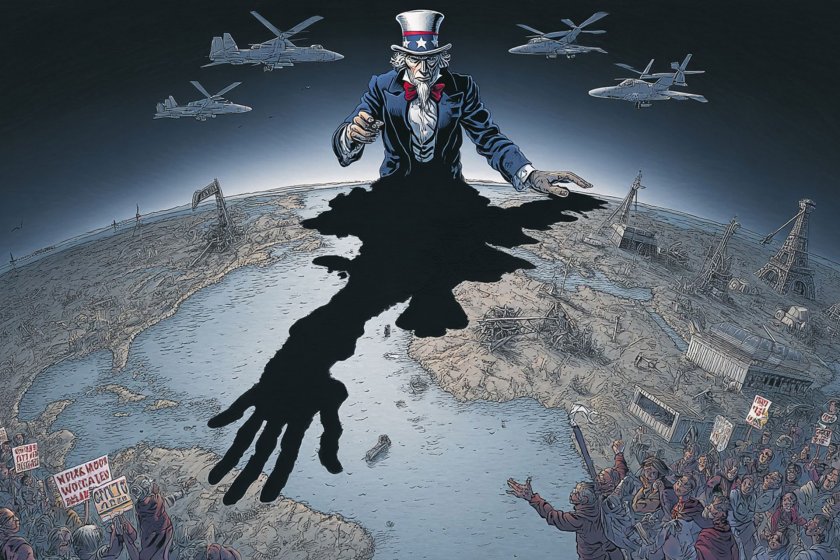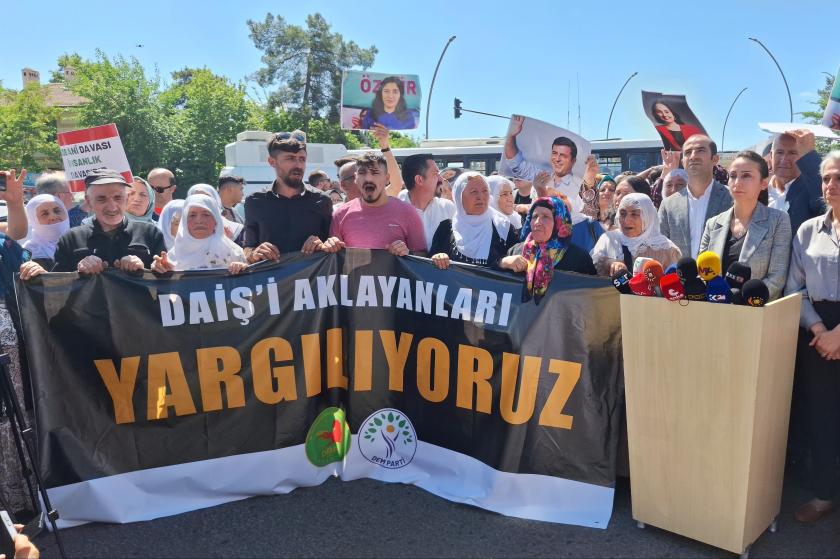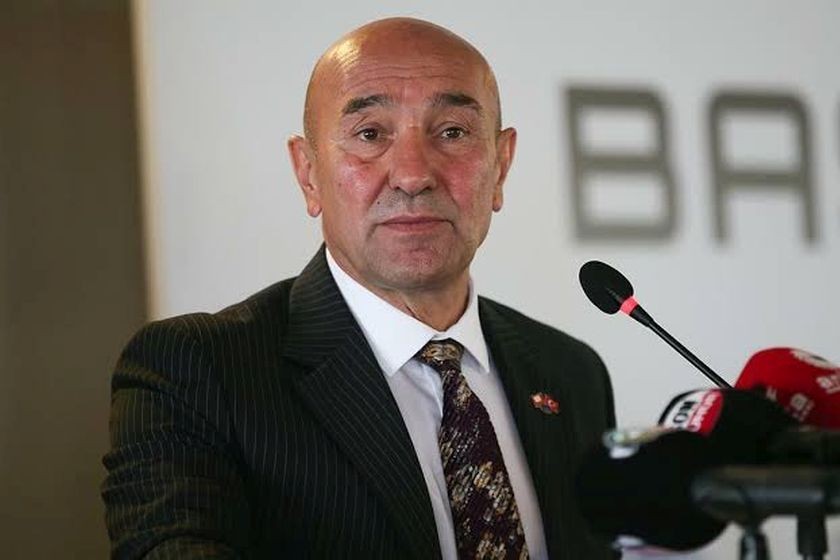The Erdoğan government is being pushed out of the regional equation!
Recent developments show us that Turkey’s assumed role and the solutions to the problems on the table in the region do not marry-up, Erdoğan government is increasingly being pushed off the table.

Fotoğraf: Mehmet Ali Özcan/AA
The leadership in Turkey is increasingly being pushed out of the equation in the region (Middle East) where it wanted to be the ‘game maker’.
Let’s take a look at the major turning points of this journey to see how we got to this point.
The uprisings that overthrew the dictators in Tunisia and Egypt in late 2010 and early 2011 spread across the entire Arab geography led the imperialists to act to redesign the region on the basis of their own political interests. As known, this design was initiated by the jihadist groups in Libya overthrowing Gaddafi with the support of NATO. The Erdoğan government, initially opposed to this intervention, soon started to host the NATO forces that intervened in Libya, and later tried to lead the policy of intervention in Syria with a claim to regional leadership. Coming forth as the heir of the Ottomans, the leadership in Turkey was proclaiming to be the powerful game-maker in re-designing the region and of course was supported by the US and French imperialists at the time.
However, things in Syria did not develop as expected by the Erdoğan government, which set out with the goal of overthrowing the Assad regime in 6 months and performing Friday prayers in the Umayyad Mosque in Damascus. Not only did Russia strengthen its position in the region, but Iran and Lebanese Hezbollah -seen as a threat by western imperialists- also expanded their sphere of influence in the region. Moreover, radical Islamist groups came to the fore in the Syrian war, which took a sectarian appearance and started to pose a serious threat to the energy resources and transit routes in the region, as seen in the example of the ISIS invasion of Mosul. One of the outcomes in Syria that the Turkish government did not foresee was the autonomous administration of the Kurds established in north of Syria (Rojava) and also [Kurds] leading in the fight against ISIS and other radical Islamist groups.
Western imperialists, when their aim to overthrow the Assad regime and surround the forces that support him failed, began to adopt a strategy of fighting ISIS in late 2014 to protect their positions and create new areas of intervention in the region. For the success of this strategy, they supported the Kurds fighting ISIS. The Erdoğan government's continued cooperation with jihadist groups and seeing the Kurds, on whom western imperialists based their intervention in Syria and Iraq, as a threat increased the gap between the western imperialists led by the USA, France and Britain and the Erdoğan government.
The Erdoğan government’s confrontation with these forces led to the end of the claims to be the ‘game-maker’, which was initially supported by the western imperialist powers.
In the face of continued USA cooperation with the Kurds in Syria and using this as a basis for intervention in Syria and the region, the Erdoğan government approached Russia and carried out operations with the support/approval of Russia. The government in Turkey began to stand out as a ‘spoilsport’ in the region at the time. Seen as a threat, Syrian Kurd’s gains were curtailed with operations, starting with the Euphrates Shield in August 2016 carried out with the consent/support of Russia. Of course, NATO members Turkey and US confronting one other through this cooperation benefitted Russia the most as they wanted to spoil the plans of the USA.
For Russia, cooperation with the Erdoğan government was also a very useful in terms of the purging of jihadist groups in regions such as Aleppo, Eastern Ghouta and Deraa and moving them to Idlib. However, once the transfer was complete, operations on Idlib -the last bastion of the jihadist groups- by the Syrian army and the Russians led to a stand-off between Turkey and Russia.
This time it was the turn of the US to put Turkey in the position of the actor wrecking the game by encouraging confrontation with Russia. Earlier this year (in February), the US Special envoy to Syria, Jeffrey, in a visit to Ankara following the death of Turkish soldiers in an attack of Syrian army in Idlib, said “We have martyrs in the field, may they rest in peace”, signalling their readiness to support Turkey.
Later, it was the turn of Libya. In late 2019, the Erdoğan government signed two agreements on "Limitation of Maritime Jurisdictions” and “security and military cooperation" with the Government of National Accord (GNA) of al-Sarraj, which was in a difficult situation against the forces of Haftar, supported by Russia. The Turkish government sent thousands of jihadist militants from Idlib to Libya and provided substantial military support such as armoured vehicles, tanks, unmanned (armed and unarmed) combat aerial vehicles to the GNA. This support helped break the siege of Tripoli by the forces of Haftar and the strategically important Watiyye Base fell into the hands of the GNA. Once again Erdoğan government was on stage as the spoilsport.
Erdoğan government was to enjoy the victory and spreading the propaganda that any power equation in Libya without Turkey would not be possible. But new developments emerged, showing that being the ‘spoilsport’ did not carry as much weight at the table as previously assumed. In August al-Sarraj led GNA and Haftar's Libyan National Army (LNA) declared a ceasefire. At the same time, al-Sarraj went to Paris and met with Macron, whom the Erdoğan government had confronted in Libya and the Eastern Mediterranean. Afterwards, in the meetings in Morocco, al-Sarraj and Haftar announced their agreement on appointments to the higher institutions of the state. Recently, a permanent ceasefire was declared during the meetings held in Geneva under the supervision of the UN. President Erdoğan’s statement, “It does not look likely to be reliable to me” explain the situation that Turkey found itself in; the terms of the ceasefire propose that all paid solders and foreign fighters be removed from the country within 3 months.
The death of 78 militants in Idlib, according to the Syrian Observatory for Human Rights (SHR), in an attack by Russia on the Turkey supported Feylaku'ş Damascus group, one of the umbrella organisations of Syrian National Army marks the end of the role spoilsport and the beginning of more discord between Turkey and Russia. Although it was portrayed as a ‘gesture of good will’ for Russia, having to move the observation points primarily in Mornik to the south of the M4 motorway is in fact an indicator of the increasing limitation to the ability to move in the area.
Another development that will further limit the range of movements in the area for the Erdoğan government is attempts by the US government to increase cooperation between the Gulf states of Israil, UAE and Saudi Arabia and others – already in tense relationships with the Turkish leadership; and furthermore, to encourage these countries to reconcile with Qatar -the most important ally of Turkey in the region.
To sum it up, recent developments show us that Turkey’s assumed role and the solutions to the problems on the table in the region do not marry-up, Erdoğan government is increasingly being pushed off the table. However, this does not mean that the imperialist powers in the region are giving up on Turkey. On the contrary, its scope of action increasingly limited, the Erdoğan government is forced to conform to the political axis imposed by the imperialist powers. After all, the policy based on creating a space for itself by leaning on this or that imperialist when it suits you, and trying to pass it as anti-imperialism, could only go so far.






Evrensel'i Takip Et